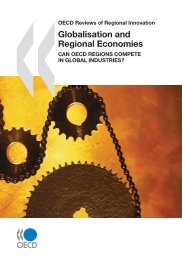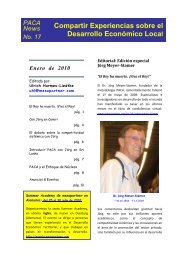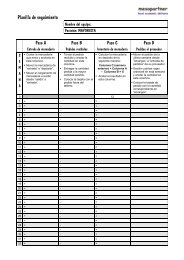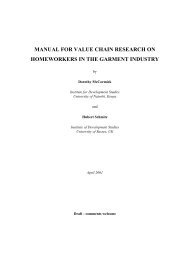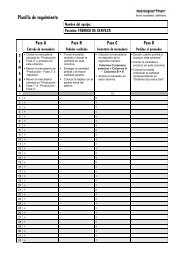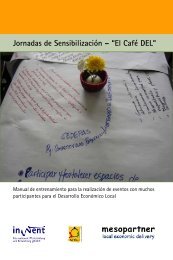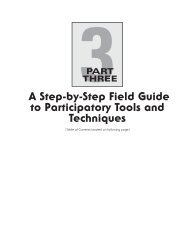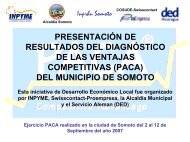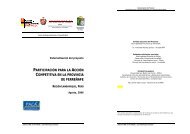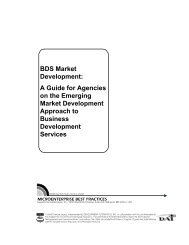R Chambers - Notes for participants in PRA-PLA course.pdf - PACA
R Chambers - Notes for participants in PRA-PLA course.pdf - PACA
R Chambers - Notes for participants in PRA-PLA course.pdf - PACA
You also want an ePaper? Increase the reach of your titles
YUMPU automatically turns print PDFs into web optimized ePapers that Google loves.
7<br />
Community-Led Total Sanitation (see Kar reference). Typically, demand <strong>for</strong> tra<strong>in</strong><strong>in</strong>g<br />
exceeds the supply of good tra<strong>in</strong>ers. <strong>PRA</strong> tra<strong>in</strong>ers who have really "got it" number<br />
hundreds if not thousands worldwide now. But all too often they have to sacrifice<br />
their livelihoods <strong>in</strong> order to resist the outrageous demands of some fund<strong>in</strong>g agencies.<br />
<strong>PRA</strong> has also become a fashionable label, with "expert" consultants say<strong>in</strong>g they can<br />
provide <strong>PRA</strong> and <strong>PRA</strong> <strong>in</strong> however short a time. There used to be a prejudice among<br />
some fund<strong>in</strong>g agencies that tra<strong>in</strong>ers had to be recruited <strong>in</strong> the North, but that is now<br />
pretty well a th<strong>in</strong>g of the past. <strong>PRA</strong> was developed <strong>in</strong> the South and most of the good<br />
tra<strong>in</strong>ers are <strong>in</strong> and from the South. And they <strong>in</strong>sist on tra<strong>in</strong><strong>in</strong>g <strong>in</strong> the field, and on<br />
plenty of time <strong>for</strong> it. Any lender or donor who demands <strong>PRA</strong> and does not make<br />
provide <strong>for</strong> this has a lot to answer <strong>for</strong>.<br />
Fund<strong>in</strong>g agencies and Government Departments, and even NGOs, rarely recognise<br />
that they themselves need <strong>in</strong>stitutional changes - of cultures, procedures and rewards<br />
– if they are to promote and susta<strong>in</strong> good participation and good <strong>PRA</strong>. We are<br />
learn<strong>in</strong>g what those necessary changes are. It is no good preach<strong>in</strong>g participation at<br />
the grass roots while ma<strong>in</strong>ta<strong>in</strong><strong>in</strong>g an authoritarian hierarchy "above", with fund<strong>in</strong>g<br />
agency or department-driven targets, punitive management, control-oriented<br />
managers, and the like. When it comes to promot<strong>in</strong>g participation, large bureaucracies<br />
with pressures to disburse are deeply disabled. We need therapies <strong>for</strong> their<br />
rehabilitation.<br />
The scale of good <strong>PRA</strong> is <strong>in</strong>creas<strong>in</strong>g. But there is far, far, still to go.<br />
Start<strong>in</strong>g, and go<strong>in</strong>g where?<br />
Some people whose attitudes are truly participatory can, with a m<strong>in</strong>imum of exposure,<br />
simply go ahead and learn as they go. The short paper "Start, stumble, self-correct,<br />
share" which I will hand out encourages such people to start, recognis<strong>in</strong>g that much<br />
depends on our personal behaviour and attitudes, and that we all make mistakes. The<br />
behaviour and attitudes required of us as "uppers" (outsiders, professionals, people<br />
who tend to dom<strong>in</strong>ate) <strong>in</strong>clude: critical self-awareness and embrac<strong>in</strong>g error; sitt<strong>in</strong>g<br />
down, listen<strong>in</strong>g and learn<strong>in</strong>g; not lectur<strong>in</strong>g but "hand<strong>in</strong>g over the stick" to "lowers"<br />
(people who are local, less educated, younger, marg<strong>in</strong>alised, usually dom<strong>in</strong>ated) who<br />
become the analysts and ma<strong>in</strong> teachers; hav<strong>in</strong>g confidence that "they can do it"; and a<br />
relaxed and open-ended <strong>in</strong>ventiveness.<br />
Much <strong>PRA</strong> is enjoyed, both by local <strong>participants</strong> and by outsiders who <strong>in</strong>itiate it. The<br />
word "fun" has entered the vocabulary and describes some of the experience. But<br />
some people with a strong discipl<strong>in</strong>ary tra<strong>in</strong><strong>in</strong>g f<strong>in</strong>d the reversal of teach<strong>in</strong>g and<br />
learn<strong>in</strong>g difficult. It is not their fault. We can help one another firmly but<br />
sympathetically. And we can amiably tease one another when we slip <strong>in</strong>to "hold<strong>in</strong>g<br />
the stick"; as of <strong>course</strong> I shall do!<br />
Where does all this lead? How crucial is it that "lowers" should conduct their own<br />
<strong>in</strong>vestigations and analysis? Does <strong>PRA</strong> provide a strategy <strong>for</strong> local empowerment and<br />
susta<strong>in</strong>able development? What happens when it goes to scale? Can self-critical<br />
awareness be part of the genes of <strong>PRA</strong>, so that it is self-improv<strong>in</strong>g as it spreads?<br />
These are questions you may wish to reflect on <strong>for</strong> yourself. For many now they are<br />
be<strong>in</strong>g answered by shar<strong>in</strong>g experience. To present background, and <strong>in</strong> search of<br />
understand<strong>in</strong>g and answers, here are some head<strong>in</strong>gs and notes. But write your own.....



